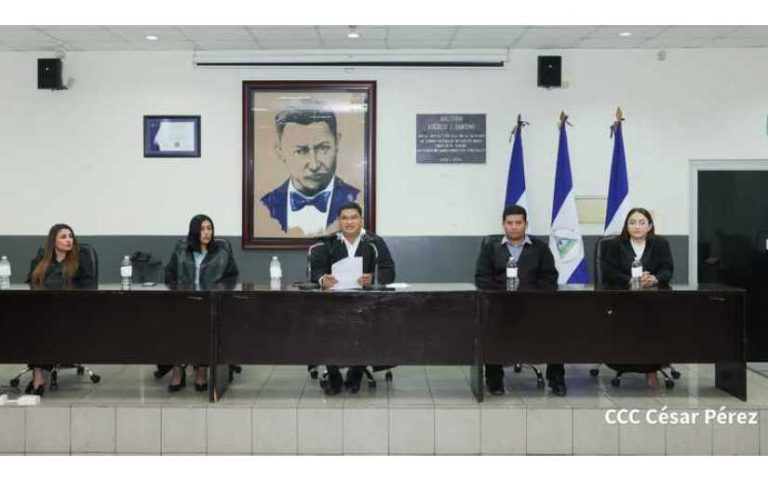22 de febrero 2023

The Cuban Regime’s Punishment for Filming a Protest

PUBLICIDAD 1M
PUBLICIDAD 4D
PUBLICIDAD 5D
All of these international legal instruments have been signed and adopted by Nicaragua, including some during Ortega's own past presidential periods

Appeals Magistrate, Ernesto Rodríguez Mejía, reads the court rulings // Photo: Taken from El 19 Digital
The stripping of the nationality of 317 Nicaraguans who have expressed criticism of the Daniel Ortega-Rosario Murillo dictatorship violates Nicaragua's own Political Constitution, as well as at least six international accords and conventions, according to humanitarian organizations and legal experts.
The first group whose nationality was revoked by the regime were the 222 ex-political prisoners, who had been held hostage in prisons since mid-2021 and were expelled and banished from the country on February 9.
The following day, Ortega added to the list Monsignor Rolando José Álvarez, bishop of the Diocese of Matagalpa and Apostolic Administrator of the Diocese of Estelí, sentenced to more than 26 years in prison after refusing to be exiled to the United States by the dictatorship.
The second group was made up of 94 Nicaraguans, most of whom are in exile. In addition, they were also declared "fugitives from justice". Among them are writers Sergio Ramírez and Gioconda Belli; the auxiliary bishop of Managua, Silvio Báez; veteran human rights defender Vilma Núñez; the director of CONFIDENCIAL, Carlos Fernando Chamorro and his wife Desirée Elizondo; and former commander Luis Carrión, Ortega's former comrade-in-arms.
Against these 94 Nicaraguans, the regime also ordered "the immobilization and confiscation" by the State of Nicaragua "of all properties and companies" registered fully or partially in their names.
Edgardo Riveros Marín, professor of International and Constitutional Law at the Central University of Chile, told EFE news agency that "by arbitrarily stripping a person of his or her nationality, a series of international instruments and treaties are being violated".
Some of the treaties being violated are:
The UN High Commission on Refugees (UNHCR) warned this Friday that the arbitrary deprivation of Nicaraguan nationality "violates international law", and demanded that the Ortega and Murillo government "respect its international obligations, guarantee the right to nationality, and take measures to prevent stateless persons."
The agency recalled that "the exercise of fundamental rights such as freedom of expression, assembly and other rights associated with political opinions can never justify the withdrawal of nationality."
Article 20 of the Political Constitution of Nicaragua states: "No national may be deprived of [their] nationality. The condition of being a Nicaraguan national is not revoked by the fact of acquiring another nationality."
And Article 21 of the Constitution, reformed last week in the first of two legislative periods, now states: "The acquisition, loss and recovery of nationality shall be regulated by the laws. Traitors to the homeland lose the condition of Nicaraguan nationality."
The reformed constitutional article 21 must be approved in a second legislative period next year for it to enter into force, argued the Human Rights Collective Nicaragua Nunca +, in a statement.
The special law regulating the loss of Nicaraguan nationality, promoted and approved by the Sandinistas in an expedited manner last week, "is based on a reform that is not admissible, because partial reforms to the Political Constitution of Nicaragua must be discussed in two legislative periods, since they affect the entire legal system of a nation," explained the organization.
The human rights organization further alleged that "the Ortega-Murillo regime violated the principle of legality, the right to equality and non-discrimination, left people stateless, and did not respect the guarantees of due process nor the special guarantees for the protection of children."
"Everything was unilateral. None of the people were notified (it was in absentia) about the initiation of the case, which did not give reasons for the loss of nationality. They were not given the opportunity to defend themselves, or to have a fair hearing or legal advice or the right to review or appeal their cases," the organization's statement said.
For the human rights Collective, "the resolutions disguised as legality by the Court of Appeals of Managua are unconstitutional and arbitrary" and are part of "the continuity of repressionand the implementation of legal atrocities through penalties and punishments against those who think differently and have raised their voices demanding justice, truth and non-repetition."
*With information from EFE
This article was originally published in Spanish in Confidencial and translated by our staff.
PUBLICIDAD 3M
Confidencial es un diario digital nicaragüense, de formato multimedia, fundado por Carlos F. Chamorro en junio de 1996. Inició como un semanario impreso y hoy es un medio de referencia regional con información, análisis, entrevistas, perfiles, reportajes e investigaciones sobre Nicaragua, informando desde el exilio por la persecución política de la dictadura de Daniel Ortega y Rosario Murillo.
PUBLICIDAD 3D